Radio towers are typically tall structures designed to support antennas for tele communications and broadcasting, including television. There are 2 main types: guyed and self-supporting structures.
They are among the tallest human-made structures. Mosts are often named after the broadcasting organizations that originally built them or currently use them.
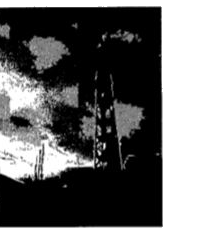
On a similar concept, a radio - station tower was built in two sections A and B. From a point 24 m from the base of the tower, the angle of elevation of the top of section A is 30∘ and the angle of elevation of the top of section B is 45∘).
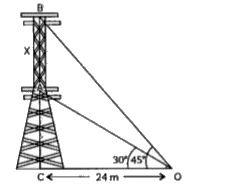
On the basis of the above information, answer any four of the following question:
The length of the wire structure from the point to the top of section A is
11.8 m
14.6 m
27.7 m
33.84 m
Step by step video & image solution for Radio towers are typically tall structures designed to support antennas for tele communications and broadcasting, including television. There are 2 main types: guyed and self-supporting structures. They are among the tallest human-made structures. Mosts are often named after the broadcasting organizations that originally built them or currently use them. On a similar concept, a radio - station tower was built in two sections A and B. From a point 24 m from the base of the tower, the angle of elevation of the top of section A is 30^(@) and the angle of elevation of the top of section B is 45^@). On the basis of the above information, answer any four of the following question: The length of the wire structure from the point to the top of section A is by Maths experts to help you in doubts & scoring excellent marks in Class 10 exams.
Topper's Solved these Questions
Similar Questions
Name the structures which support the body of sponges as a skeleton:
View SolutionRadio towers are typically tall structures designed to support antennas for tele communications and broadcasting, including television. There are 2 main types: guyed and self-supporting structures.
They are among the tallest human-made structures. Masts are often named after the broadcasting organizations that originally built them or currently use them.
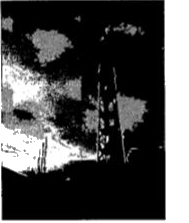
On a similar concept, a radio - station tower was built in two sections A and B. From a point 24 m from the base of the tower, the angle of elevation of the top of section A is 30∘ and the angle of elevation of the top of section B is 45∘).
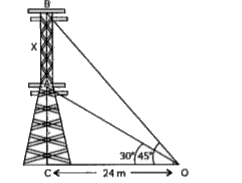
The height of the section B isView Solution
Knowledge Check
- Question 1 - Select One
Radio towers are typically tall structures designed to support antennas for tele communications and broadcasting, including television. There are 2 main types: guyed and self-supporting structures.
They are among the tallest human-made structures. Masts are often named after the broadcasting organizations that originally built them or currently use them.
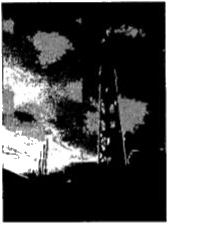
On a similar concept, a radio - station tower was built in two sections A and B. From a point 24 m from the base of the tower, the angle of elevation of the top of section A is 30∘ and the angle of elevation of the top of section B is 45∘).
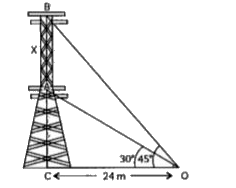
On the basis of the above information, answer any four of the following question:
The length of the wire structure from the point o to the top of section B isA11.8 mB14.6 mC27.7 mD33.84 m - Question 2 - Select One
Radio towers are typically tall structures designed to support antennas for tele communications and broadcasting, including television. There are 2 main types: guyed and self-supporting structures.
They are among the tallest human-made structures. Masts are often named after the broadcasting organizations that originally built them or currently use them.
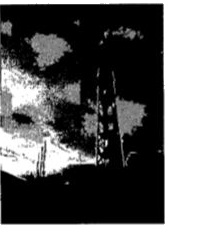
On a similar concept, a radio - station tower was built in two sections A and B. From a point 24 m from the base of the tower, the angle of elevation of the top of section A is 30∘ and the angle of elevation of the top of section B is 45∘).
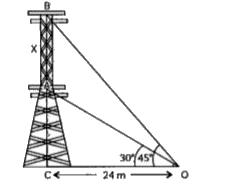
The height of the tower isA17.9mB24mC31.6mD20 m - Question 3 - Select One
Radio towers are typically tall structures designed to support antennas for tele communications and broadcasting, including television. There are 2 main types: guyed and self-supporting structures.
They are among the tallest human-made structures. Masts are often named after the broadcasting organizations that originally built them or currently use them.
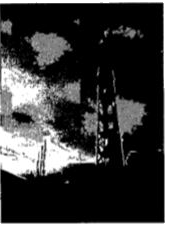
On a similar concept, a radio - station tower was built in two sections A and B. From a point 24 m from the base of the tower, the angle of elevation of the top of section A is 30∘ and the angle of elevation of the top of section B is 45∘).
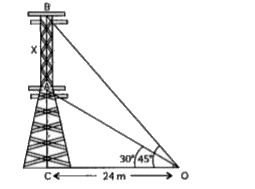
The height of the section A isA13.84mB14.6mC16.7mD34.6m
Supportive skeletal structures in the human external ears and nose tip are of
View SolutionFor television broadcasting, the frequency employed is normally
View SolutionFor television broadcasting, the frequency employed is normally.
View SolutionFor television broadcasting the frequency employed is normally
View SolutionFor television broadcasting , the frequency employed is normally
View Solution

